The Burnt Toast Guide to Kids & Anti-Fat Bias
What to say when your kid says "fat."
ICYMI, BT Guides are a new recurring series where I dig into your most frequently asked questions. Here’s the first one, on weight and health.
Today we’re going to get into how we have these conversations with kids. Those moments when your 4-year-old calls someone fat in the grocery store, or your 11-year-old asks if he’s too fat are so hard and awkward to navigate. But they are also when we can do some of our most important work as parents, and towards changing our larger cultural conversations about bodies, food and health.
How Do We Talk To Kids About Fatness and Anti-Fat Bias?
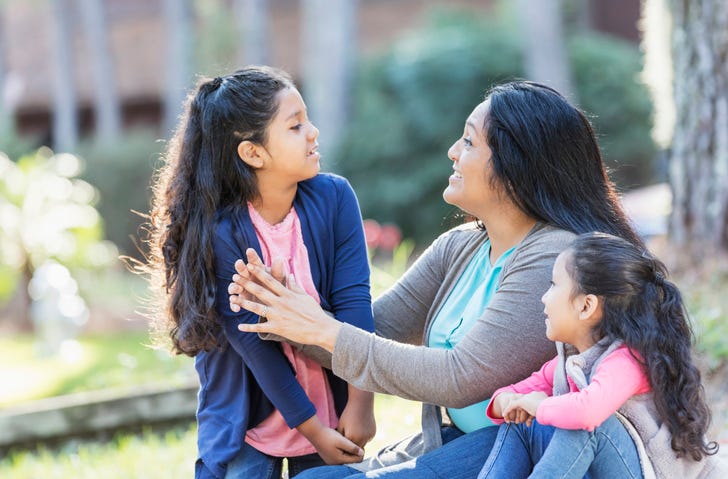
1. Know that saying nothing says a lot.
It’s normal to freeze up the first time your kid calls someone fat, calls themselves fat, or asks you how much you weigh. So know that you don’t have to get this right in the first conversation, because Fat Talks are never just one conversation. But I find parents are often reluctant to have any conversation about fatness. They don’t want to name the potential for a should-be-benign activity like eating more vegetables or using a fitness tracker to perpetuate anti-fatness, even if they are worried about the impact of such an activity on their kid. They don’t want to name the fatphobia in a child’s favorite show or book or talk to their kids about anti-fatness and diet culture more broadly because they don’t want to introduce their kids to these ideas, in case that new knowledge plants insecurities that their child isn’t already struggling with.
Alas: Research shows that kids learn that fat bodies are bad in preschool and early elementary school. So even if they haven’t voiced this to you yet, odds are, they already know what you’re afraid to tell them. And you risk doing more damage by not filling the void.
But by talking about this—even when it’s uncomfortable, even if you get some of it “wrong”—you can offer the counter-narrative they need. You can explain that all bodies are good, and all bodies deserve dignity and respect. If they are engaging in a behavior that concerns you (frequent workouts, lots of mirror checking), talking about that now will open up the door to a conversation if that habit becomes problematic or stressful for your child. Because if they think you approve of step counting and then they find themselves getting obsessive about it, they may feel ashamed to share that with you. But if you’ve noted, “some people love these things, and some people find them really stressful, let’s check in and see how it feels for you?” you’ve let them know it’s okay to need help navigating this.
That said: You can always say less about your kid’s body and their eating habits if your tendency is to nitpick or critique. Silence is absolutely preferable there!
Related Reading:
Thoughts on Fatphobia in Kids' TV
2. Reclaim “fat” as a good way to have a body.
“You’re not fat, you’re beautiful!” “Don’t say ‘fat,’ that’s not nice!” and “I’m not fat, I’m fluffy!” are all well-intentioned things parents say to children when fatness comes up—and every single one of them reinforces to kids that fat is a bad way to be.
Here are some replacement scripts:
“Yes, you’re fat, and we think that’s great!”
“All bodies are good bodies.”
“Yes, that person is fat. Bodies come in all shapes and sizes, which is so cool! But we don’t talk about anyone’s body without their consent.”
“Are you worrying about body size right now? Tell me about it.”
“We never want you to feel like you need to take up less space.”
If all of those feel scary to say out loud, you’ll want to start by doing your own work around this, both in terms of your body and your child’s—because your child’s body size is not your fault and it’s not your job. (A fat positive therapist can be helpful here.) In addition to changing how you respond when fatness comes up, think about how you can build fat community, and how you can lean into making your home safe and welcoming for all bodies. Choose art with beautiful fat bodies. Read books and watch shows with strong fat protagonists. If you’re buying a new piece of furniture, talk about how you’re trying to choose something that will work for all bodies. Talk about the fatness spectrum. We’ll talk more about food in an upcoming guide, but for sure, keep weight talk away from your family dinner table and make sure you’re consistently encouraging every kid to honor their hunger, regardless of body size.
Once you’ve made fat just another great way to have a body in your house, you’ll start to feel much clearer on how to navigate the times when kids call each other fat, or have the word weaponized against them. These instances also won’t feel so momentous because you will have normalized fat positivity as your baseline. And taking the negative connotations away from weight means you don’t have to get hung up on the times when your child’s weight is a perfectly reasonable thing to need to know, like when you’re sizing a carseat.
Related Reading:
“Sometimes Foods” and Kids Getting Fed Twice
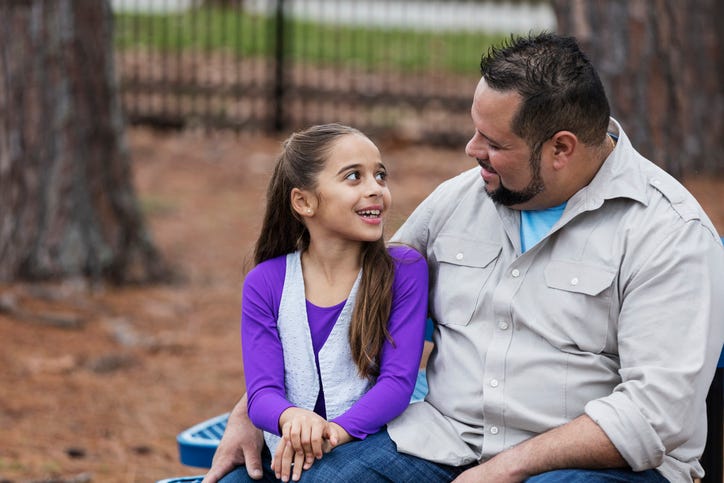
3. Name Anti-Fatness and Diet Culture
Just like we know that white parents have to talk to our kids about racism because if we don’t, we raise kids with racist beliefs, we have to talk to our kids about anti-fatness in order to raise kids who are fat positive, whether they are fat themselves or straight-sized allies. But you can know that on paper and still struggle to execute it — because the thought of our kids encountering diet culture in the wild is deeply unsettling. You may have a knee-jerk impulse to ban Barbie or TikTok or avoid any other place your child is likely to encounter negative body messages. But that’s another kind of diet mentality. Our goal isn’t to keep our kids in diet culture-free bubbles forever, or only expose them to the “right” kinds of messages. It’s to help them navigate diet culture, and be resilient in the face of anti-fatness. To do that, they need a combination of critical thinking skills and the fundamental knowledge that their value is not tied to their appearance.
When kids have those tools, anti-fatness — whether it shows up as a Disney princess, a Harry Potter character, Peppa Pig, or a throwaway joke on literally every sitcom ever—becomes so much easier to name and start to dismantle. This also means that you don’t need to ban your kids from engaging with this stuff, because restriction will only breed fixation. But you can be curious, name what you see, and ask what they think. If they know they can explore these trends without losing your respect or facing your judgment, it’s a lot safer for them to come to you with questions, or just decide on their own that it’s not for them.
Related Reading:
4. Talk to thin kids about anti-fat bias and thin privilege.
A common response to my push for parents to talk about fatness is: “Yes and my thin kid struggles so much too, because people say awful things to her!” These comments are toxic and unhelpful, and no child deserves to have their body objectified or policed by other people (especially adults). And, it’s important to understand that anti-fatness is the bedrock of thin shaming too. When we tell a thin person to “eat a sandwich,” or marvel at how they can “eat so much and stay so skinny!” we’re really saying that we envy their thinness because we don’t want fatness. That’s harmful for any fat kid within earshot to overhear. And it teaches thin kids that they need to stay thin in order to be considered pretty or valuable.
Instead, we need to normalize for all kids the fact that bodies change—many thin kids are fat adults and this is not a failure. And we need to help our thin kids understand how they benefit from systemic thin privilege. Yes, even if they also experience skinny shaming, even if they struggle with disordered eating — the world is still built for their body size in ways that are problematic and leave other people out.
You can and should still validate your thin child’s anxieties about whether their body will be accepted by the world — the world makes that really hard, after all! But rather than reassuring kids they are pretty or thin (which only reinforces that those are traits to hang onto at any cost), we can explore with them why pretty feels like it matters so much. Then they can consider whether that’s a value they want or need to hang onto, or not.
Related Reading:
FAT TALK, Chapter 4
5. Talk to fat kids about their experiences of bias—and the magic of their bodies.
The most important thing we can do for our fat kids is believe what they tell us about their bodies, and their experiences of the world. Fat kids are often adultified from an early age. They are likely to be bullied by peers and by adults, including family members. They get picked last for the team, or they may not join the team because the uniform doesn’t fit. And none of this is their fault. Here’s what I wrote at the end of Fat Talk, about what fat kids have told me they need to help them navigate this world:
What fat kids need is to know that we see them, we accept them, and we know they are worthy of respect, safety, and dignity. They need to know we believe this unconditionally; that we would not love them more if they weighed less because our love already has no limit. And they need to know that we trust them to be the experts regarding their own bodies and physical wants and needs. [...] And fat ids need to know that we know the world. They need to see us advocate for them with doctors, teachers and family members who see their weight as a problem. One magic phrase you can use in almost every scenario: “I trust their body.”
[...] We can’t rush past how hard and isolating it can feel to be a fat kid with our determination to help them love their bodies. Depending on what they’ve been through, loving their bodies may not always feel possible. So, if they tell us they don’t want to be fat, we must hear it. But we can validate how hard it is to be harmed by anti-fat bias without upholding that same bias: “Our culture makes it so hard to be fat. But your body is never the problem. I never want you to make yourself smaller. I want you to take up all the space you need in the world.”
Related Reading:

Parenting in Diet Culture Book List
PICTURE BOOKS
Beautifully Me by Nabela Noor, illustrated Nabi H. Ali
Bodies Are Cool by Tyler Feder (And here’s Tyler on the BT Podcast!)
Dino-Gro by Matt Myers
Her Body Can by Katie Crenshaw and Ady Meschka
I Am Enough by Grace Byers, illustrated by Keturah A. Bobo
I Love My Body Because by Shelly Anand and Nomi Ellenson (here they are on the pod!)
We’re All Works of Art by Mark Sperring, illustrated by Rose Blake
Your Body Is Awesome: Body Respect for Children by Sigrun Daníelsdóttir
Every Body: A First Conversations Book About Bodies — the first kids book I’ve seen that names white men as the reason for anti-fat bias!
MIDDLE GRADE BOOKS
All of Me by Chris Baron
Chunky by Yehudi Mercado
Good Enough by Jen Petro-Roy
Starfish by Lisa Fipps
Taking Up Space by Alyson Gerber (on the pod here!)
PUBERTY AND BODY IMAGE BOOKS
Celebrate Your Body (And Its Changes, Too!): The Ultimate Puberty Book for Girls by Sonya Renee Taylor
The Intuitive Eating Workbook for Teens by Elyse Resch
Love Your Body by Jessica Sanders and Carol Rossetti
No Weigh! A Teen’s Guide to Positive Body Image, Food, and Emotional Wisdom by Signe Darpinian, Wendy Sterling, and Shelley Aggarwal (here’s Signe on the pod!)
You Are Enough: Your Guide to Body Image and Eating Disorder Recovery by Jen Petro-Roy
YOUNG ADULT BOOKS
Dumplin’ by Julie Murphy (also VERY excited for her picture book, Chubby Bunny, out October 2023!)
Every Body Shines, edited by Cassandra Newbold
Faith Taking Flight by Julie Murphy
Fat Chance, Charlie Vega by Crystal Maldonado (Also all of Crystal’s books, also here she is on the podcast)
Love is a Revolution by Renee Watson
The Other F Word: A Celebration of the Fat and Fierce, edited by Angie Manfredi
BOOKS FOR PARENTS
Body Happy Kids by Molly Frasier
How to Raise an Intuitive Eater: Raising the Next Generation with Food and Body Confidence by Sumner Brooks and Amee Severson (here’s Amee on the podcast!)
Raising Body Positive Teens: A Parent’s Guide to Diet-Free Living, Exercise and Body Image by Signe Darpinian, Wendy Sterling, and Shelley Aggarwal (here’s Signe on the pod!)
When Your Teen Has an Eating Disorder by Lauren Mulheim, PsyD















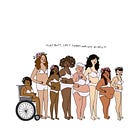

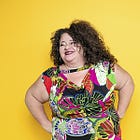
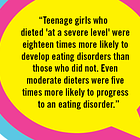

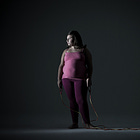
















One parenting technique I've found helpful is to discourage comments on people's appearance in general. This has been helpful with a whole range of things: weight, height (my tall friends are as sick of comments as my fat friends), disability, race, gender, etc etc. Responses I've used: "How someone looks is usually the least interesting thing about them," "Let's not focus on people's appearance" and "Why does this matter?" Now my daughters have internalized this to the point where they will call me out when I forget and comment on someone's appearance.
So good and so helpful, Virginia, as always. Sometimes when I don't know what else to say I simply revert to, "All bodies are good bodies." That at least buys me a little time to formulate my thoughts before going further.